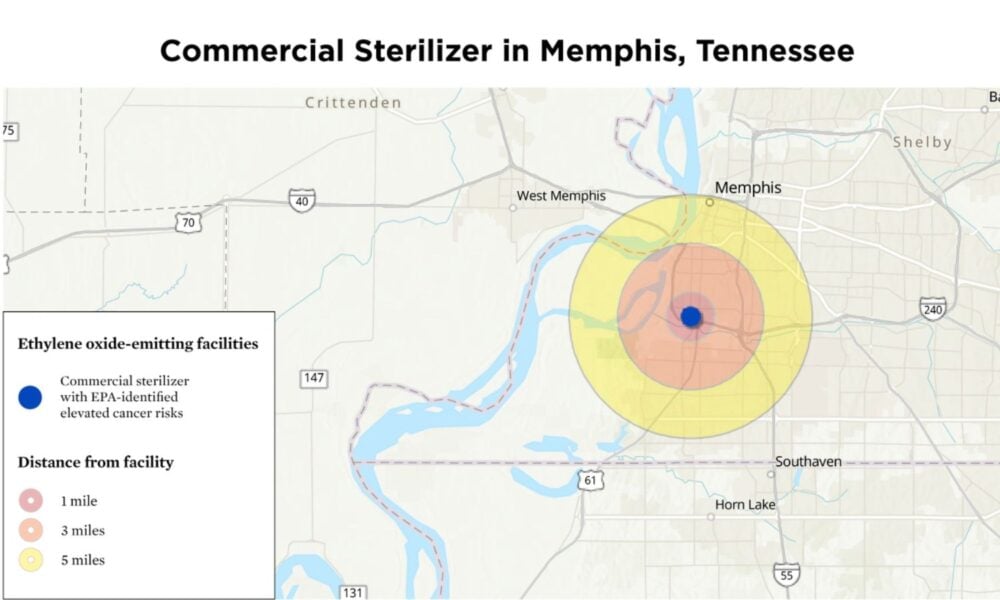In a major win for community members in South Memphis, Tennessee, a facility emitting a toxic air pollutant—ethylene oxide (EtO)—announced late last month that it will close its doors. UCS featured the facility in its analysis earlier this year of the public health threat EtO poses to communities across the country.
The facility in question, Sterilization Services of Tennessee, is one of roughly 90 facilities in the United States and Puerto Rico that use EtO, a toxic colorless gas, to sterilize products such as medical devices and dried food products. While EtO is an effective sterilant, it is also a carcinogen. Breathing EtO over a long period of time can increase people’s risk of developing certain types of cancer, especially white blood cell cancers and breast cancer.
The facility in South Memphis was among the most dangerous commercial sterilization facilities in the United States, featured by the US Environmental Protection Agency (EPA) as one of more than 20 facilities contributing to “elevated cancer risks” in nearby communities. Last year, EPA estimated that EtO emissions from the South Memphis facility could contribute to as many as 2,000 additional cancer cases per one million people exposed—a risk level 200 times greater than what EPA deems “acceptable.” Short-term exposure to high levels of EtO can also contribute to respiratory and gastrointestinal issues.
Community advocates fought hard
South Memphis residents were shocked when they learned last year that Sterilization Services of Tennessee, operating since 1976, was emitting an invisible toxic gas in their community, which is made up of predominantly Black residents. Community members like Rose Sims began to wonder whether the facilities’ EtO emissions might explain the alarming rates of cancer and illness among her neighbors, friends, and family.
Community members quickly came together and a local grassroots group, Memphis Community Against Pollution (MCAP), began to sound the alarm. MCAP, in partnership with the Southern Environmental Law Center (SELC), petitioned the county health department to use its emergency powers to limit emissions from the facility. The agency failed to take action, but South Memphis residents and these organizations continued undeterred, pushing government agencies and legislators, asking questions, and drawing media attention.
Finally, in late August, representatives for Sterilization Services of Tennessee announced in a letter to Rep. Steve Cohen, who represents South Memphis and has been a staunch supporter for accountability at this facility, that the company would close the facility by April 30, 2024 and move to another location outside of Memphis.
Memphis featured in UCS report on EtO
Earlier this year, UCS published a report, Invisible Threat, Inequitable Impact, along with an interactive map showing the locations of commercial sterilization facilities across the United States and highlighting communities most impacted. Memphis was featured in UCS’s report because of the high emissions and disproportionate burden it presented to the community.
We found that more than 130,000 people live within five miles of Sterilization Services of Tennessee, along with 180 schools and childcare centers in the same radius. The percentages of people of color and people with low income were both 20 percent greater within five miles of the facility compared to the average for its county overall. We also estimated that EtO emissions contributed to more than 80 percent of the cancer risk attributable to toxic air pollution around the facility.
Even more, not only was this facility emitting high levels of EtO, but it was also violating the federal Clean Air Act (CAA). We found that the facility had already paid penalties for failing to comply with the CAA twice in the last five years.
This one facility – one of more than 20 other sources of pollution in South Memphis – contributed to cumulative and compounding harm to the community. It offers yet another egregious example of communities of color too often being treated as sacrifice zones for toxic emissions.
Relief ahead for residents
This victory in South Memphis lies, without a doubt, in the hands of its residents, particularly the local advocates who fought powerfully for cleaner air and greater accountability. While there is certainly cause for celebration, the fight is not over. In the interim months before the facility closes, community members have asked for air monitoring. It also remains to be seen exactly where outside of Memphis the facility will move. Regulators and legislators must ensure that the new facility won’t surreptitiously foist a similar toxic burden on another community.
While many questions remain unanswered, new federal regulations may soon bring some broader relief. This April, EPA proposed updated regulations—nearly a decade overdue—for EtO emissions from commercial sterilization facilities. While the proposed rule will require stricter emissions controls at facilities such as Sterilization Services of Tennessee, UCS joined Earthjustice, and many other advocacy and grassroots groups across the country, in submitting comments calling for improvements to ensure more accountability and to better protect public health.
EPA is currently reviewing comments on the proposed rule. Final regulations are not expected until spring 2024, and it may be at least another year before those regulations are enforced. In the meantime, however, cheers to the tireless advocates in South Memphis! Here’s hoping that the model they set can soon extend to further victories in the many communities across the nation still fighting for protection from EtO.

